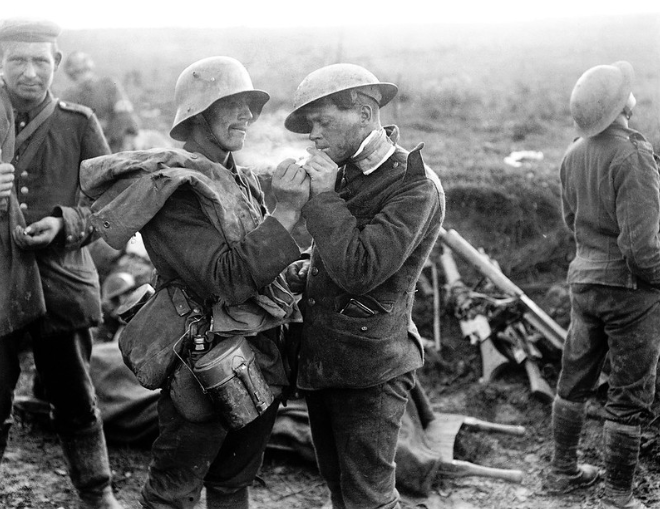One glance around our world can quickly give the impression that these are not stable times. The biblical reference of “wars and rumors of wars” is definitely apropos. At every turn the media is filled with headlines and punditry leading with terms like “backlash,” “anger,” and “harsh response.” One side accuses the other. Unrest occurs. Civil discourse is lost.
And then … Christmas.
There is something absolutely different about the season of Christmas. Not everyone believes as I do that this season we are in is the time stamp of the birth of a savior through divine intervention. But even the hardest among us are aware that something different fills the air during this season of hope. We see it in the giving of gifts, the gathering of families, the time off from school and work. We see it in the stories of extra sacrifice and hard work to buy that one small gift for a child. It is further evident in the wreaths on doors and lights on trees. Say what you will, but Christmas is different.
To be sure, there are those who don’t celebrate Christmas for reasons of faith or no faith. Families sometimes find it a time of poignancy marked by the loss of a loved one, or an absence at the table for a servicemember overseas. But underlying the story of Christmas is a hope that things can be different. That even in the lowest of times and darkest of moments, a star can light a new way forward.
Christmas has a way of changing things. As surely as the history and faith of the world changed in a lowly Bethlehem manger over 2,000 years ago, there are still moments today that cannot be explained except to say that the spirit of Christmas overcame the worst of circumstances.
Is it just sentiment?
No, there’s something decidedly different about the Christmas season. Something that brings together what was once apart. Something that extends a hope that tides will turn.
Take the miracle of the battlefield peace that broke out in the trenches of WWI: The Christmas truce of 1914.
Just weeks before Christmas, Pope Benedict called for a temporary ceasefire on the lines, asking “that the guns may fall silent at least upon the night the angels sang.”
But war is where men die and things are broken. Officially, the pope’s plea was rejected by leadership on both sides.
The misery of trench warfare was on a scale unapparelled in world history. On the night of Christmas Eve 1914, in the mud and slog of the Belgian trenches, the 1st Battalion of the Royal Warwickshire Regiment was dug in and miserable. The trenches were cold, dank, and fearful. The men of the regiment had been on the line for endless days and sleepless nights. A British machine gunner named Bruce Bairnsfather later wrote that as he huddled in his freezing narrow trench, covered in mud, he began to hear singing.
German soldiers were across “No Man’s Land” in their own trenches singing Christmas carols. There in the darkness, some of the British soldiers began singing back. Then a voice with a thick German accent called out across the span between the lines saying, “Come over here!”
This was not normal. This did not fit the moment. After the call was repeated, a British sergeant yelled back: “You come half-way. I come half-way.”
What happened next is recorded in soldiers’ diaries, letters home, and dispatches from the front. Across the lines, running the length of the Western Front, groups of French, Belgian, British, and German soldiers declared ceasefires and crawled up out of their fortifications to meet in the middle and celebrate Christmas.
Soldiers who had just been fighting and dying began shaking hands, singing together, swapping cigarettes and cigars, pouring the occasional libation, and participating in impromptu soccer games. Western soldiers gave German soldiers haircuts. Men of both sides helped their enemies retrieve the dead who littered the battlefield.
“I shook hands with some of them, and they gave us cigarettes and cigars,” British soldier J. Reading wrote home. “We did not fire that day, and everything was so quiet it seemed like a dream.”
“How marvelously wonderful, yet how strange it was,” a German lieutenant wrote. “Christmas, the celebration of Love, managed to bring mortal enemies together as friends for a time.”
It is unclear how many troops participated in the Christmas truce of 1914. Time Magazine wrote that up to 100,000 crossed the lines to celebrate with their enemies. High commands on both sides were supposedly shocked and disapproving.
But it was Christmas. Something was different.
As the day drew to a close, a German soldier allegedly said to a British 3rd Rifle Brigade rifleman: “Today we have peace. Tomorrow you fight for your country. I fight for mine. Good luck.”
A memorial was erected in England’s National Memorial Arboretum commemorating the Christmas truce. Cast in bronze, it depicts two uniformed arms reaching out and shaking hands. In 2014, the 100th anniversary, the English and German national teams played a match in remembrance of the men who kicked a ball together in “No Man’s Land.”
Christmas is different. It doesn’t mean that problems go away per se. But this season that we are in is one that extends hope in hopeless times. In the midst of it all, God saw fit to send his Son.
May God richly bless you with the hope of this season no matter your circumstance.
Merry Christmas.
To contact Phil or request him for a speaking engagement, go to www.rightsideradio.org. The views and opinions expressed here are those of the author and do not necessarily reflect the policy or position of 1819 News. To comment, please send an email with your name and contact information to Commentary@1819News.com.
Don't miss out! Subscribe to our newsletter and get our top stories every weekday morning.










